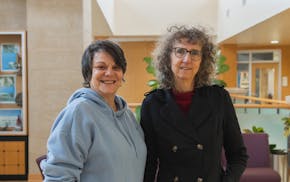Made in Chicago is an all-star jazz ensemble that has performed just one concert. Yet its members share a remarkable history that has influenced the course of modern jazz.
The group, which joins forces again Thursday at Walker Art Center, was created by drummer Jack DeJohnette, who after celebrating his 70th birthday and being named an NEA Jazz Master in 2012, was told he could put together a program of his choosing for the 2013 Chicago Jazz Festival.
The Chicago native contemplated a glorious reunion.
"What better way to celebrate coming home than sharing the stage with these great masters I grew up with and admire so much?" DeJohnette said by phone recently.
These "great masters" include pianist/composer Muhal Richard Abrams and saxophonist/composers Roscoe Mitchell and Henry Threadgill. Way back in 1962, DeJohnette, Mitchell and Threadgill were all enrolled at Wilson Junior College (now Kennedy-King College) on Chicago's South Side. DeJohnette, then studying to be a pianist, proposed a regular jam.
"There was just a chemistry; we knew there was something happening we wanted to explore," DeJohnette recalled. "We all recognized our individual voices and we spent time together to bring out what it was in each one of us."
A couple years later, Abrams saw DeJohnette playing and asked him to join his Experimental Band, a short-lived orchestra that included Mitchell and Threadgill at different points.
The collaborative spirit and DIY planning required to stage the Experimental Band concerts helped lay the groundwork for the collective known as the Association for the Advancement of Creative Musicians in 1965. The first president of the AACM, Abrams is regarded as the polestar of the organization, which provided the support system for dozens of creative musicians who transformed the Windy City into an epicenter of creative composing and improvisation.
Mitchell went on to establish the Art Ensemble of Chicago, the most influential avant-garde jazz band of the 1970s and '80s.
Threadgill has assembled a variety of profound ensembles — including Air, Very Very Circus and Zooid — to express his vivid, iconoclastic compositions.
Abrams remains a versatile elder statesman equally adept at solo concerts and impressionistic pieces for chamber orchestra.
As for DeJohnette, he moved to New York in 1966 and began playing with some of the most famous names in jazz, including John Coltrane, Miles Davis, Charles Lloyd and Keith Jarrett.
That 2013 debut concert by Made in Chicago was released Tuesday as a self-titled album on the esteemed ECM label. Its musical interplay fulfills the exalted expectations generated by its august personnel (bassist/cellist Larry Gray rounds out the group, a mere pup in his early 60s).
The first song, "Chant," begins in a rondo rhythm, which leads to the keening horns of Mitchell and Threadgill braiding in hypnotic, occasionally atonal fashion. Elsewhere, Abrams delights with hammered chords and hopscotch phrasing, and DeJohnette provides the musical, almost lyrical flair that is his signature as a drummer.
What is remarkable is the melding of contrasts into confluence within the band. Each of the four principal musicians has a hard-earned style that has evolved from sophisticated scholarship. Their ability to express themselves yet retain such a cooperative, synergistic framework is a joyful surprise.
Abrams was confident about the chemistry of the players.
"When you get to a certain level, your participation is respectful," he said. "It is easy to agree with musicians who are so secure in their individualism."
Said DeJohnette: "All of these guys play with such intensity that it gives me something to dig into. We're at a point where we're not trying to prove anything; we're just trying to play high-quality creative music."
For Mitchell, "nothing has really changed that much," he said. "We just picked up where we left off. That's the beauty of these long-lasting relationships."
After Thursday's concert, the quintet will play festivals in the United States and Europe, celebrating the release of their record and the 50th anniversary of the AACM.
"The AACM has taken on a momentum of its own, of course, but it helped Chicago sprout its wings with people like Henry and Roscoe and Muhal," said DeJohnette. "Back then we were validating each other. Now, if anything, the passion is a little greater as we've gotten older.
"It is raw in some instances and refined in other instances, but at this point in my life it is a joy to discover what comes out."
